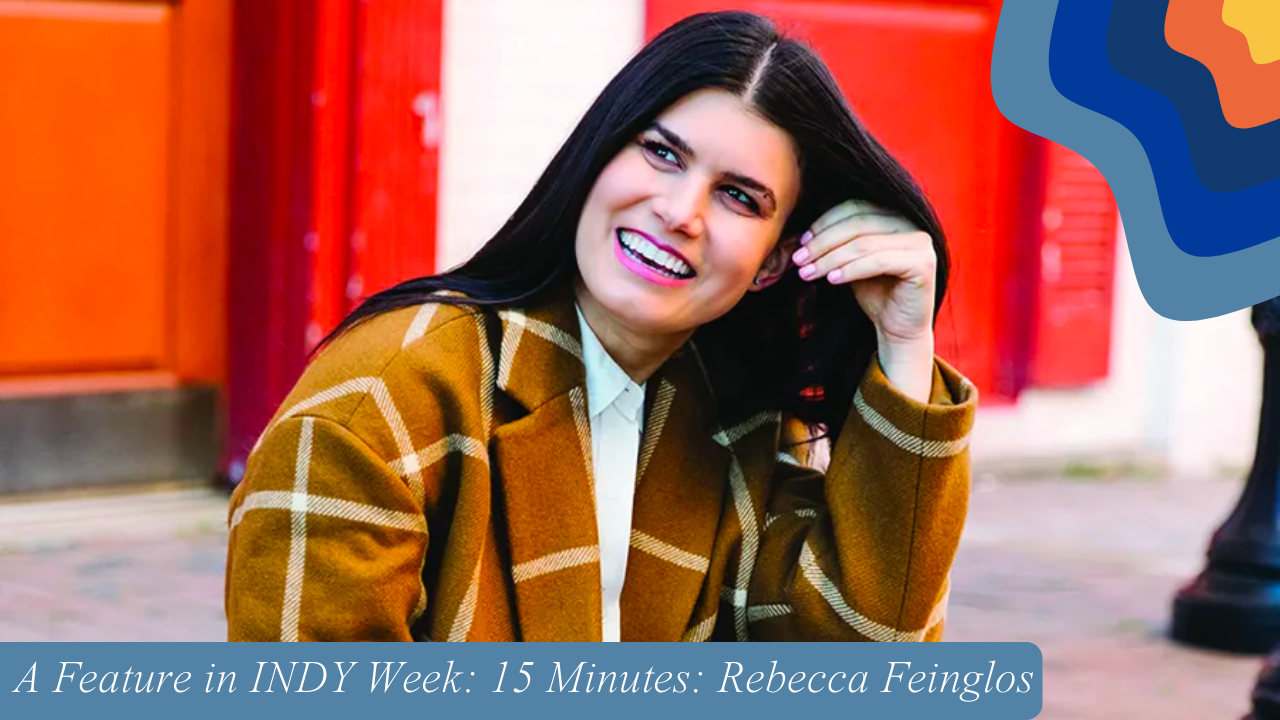A Feature in INDY Week: 15 Minutes with Rebecca Feinglos
Sep 24, 2023
Founder, Rebecca Feinglos, recently sat down with Triangle-based IndyWeek, for an interview on all things grief, loss, and Grieve Leave. She shared her personal grief journey and how she founded Grieve Leave. She shared the story of her own grief journey, which inspired the creation of Grieve Leave, placing a particular emphasis on the impactful work we are collectively undertaking—supporting one another and forging a community grounded in care and understanding. This dialogue shines a spotlight on our collective efforts, as we continue to foster a community bound by shared experiences and a resolve to create a more grief-informed world, together.
Read her interview below that originally appeared in INDY Week.
Has working in the Triangle area shaped the way you’ve worked with grieving people?
I never thought I’d be doing an interview about my work in grief and loss. My path was so focused. North Carolina and Durham are my heart and soul. It’s where I was born, where my parents settled in 1972. I went to Duke and I left afterward, but always with the intention to come back. This is my home. I lost my mother when I was young and I always wanted to just do good for the world. I always imagined I would be in government some day. I got to what I wanted—being in government in North Carolina and being close to my father. And then everything changed when he died. I think about what it’s been like to be a grieving person in North Carolina; in my generation we didn’t talk about grief.
Do you think that’s somewhat being in the South, somewhat regional?
Totally. I looked for grief support groups, and the ones I found in the Triangle are in churches. I’m Jewish— and even though some of them are interfaith, it wasn’t particularly appealing to me. I’m walking into a space where there are crosses all around me and a lot of church staff working—they’re wonderful, but that is not the environment that’s going to make me comfortable to talk about something as personal as loss. They’re clinical-feeling, people sitting in a circle. I was always the youngest person by decades. I would get mistaken for staff. And I hated it.
Particularly in the South, we have such a dearth of grief support for this inter-generation, the generation in between. We’re not supposed to be grieving yet. Little kids, whose parents die, there’s pediatric grief support. The elderly are supposed to have lost a loved one, so there are supports that exist for them. For anyone in between, there just isn’t anything.
How can we make way for things like bereavement leave, a deeper understanding of grief?
The experience I felt grieving my father’s death and then grieving my divorce was that I was the only person in the entire world who has ever felt that way. I was walking my dogs the day after my dad died, and I remember—it was also the pandemic, so everything was pretty eerie—seeing people driving their cars and thinking, “No one has any idea that yesterday was the worst day of my life. And that my person is gone and that my world is over. No one knows.” But then I started thinking, “Well, that person driving their car, maybe their loved one just died.” The more I talked about grief, the more I realized we all don’t want to talk about this thing that is actually everywhere, all the time. Everyone feels better when they feel like they’re normal and not crazy. That’s an innately human thing. That’s what grief is!
How would you define grief?
The collection of feelings that come with a loss. It’s not just one feeling, not just sadness; sometimes it is anger, longing, joy. I will look at a picture of my dad and feel bittersweetness—he’s on my cell phone background. And I love looking at him, and I miss him so much, and that is OK. All of those feelings are grief.
When we think about grief, we immediately go to death. I want to push on that, because we grieve all kinds of things. We grieve loss: the end of relationships. A year after my father died and I was an orphan at age 30, I decided to end my marriage. Even though it was my choice, I was grieving the divorce, grieving a marriage that didn’t turn out how I thought it would. We grieve ending friendships, a scary medical diagnosis, moving across the country, getting older, watching our parents get older …
Periods of our lives.
Join the Grieve Leave movement
Share your info to join our Grieve Leave community. You don’t want to miss anything!


